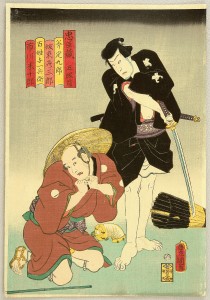Commoner Men’s Names in Edo-Era Japan, part 1

In Edo-era Japan, aristocratic men had a dazzling array of names: clan names, family names, official titles; baby names, childhood names, an adult name that was so personal and private that no one used it except the man’s lord, his sovereign, and the gods; and an adult name that he used as a personal name in public. All of these names were the privilege of the upper classes. Commoners had a single name that they acquired in childhood and bore their entire lives; and these lifelong names often sounded like aristocratic men’s cast-off childhood names, a sweet reminder that the aristocracy was so much more grown-up and responsible than those ignorant peasant louts.
Well, that was how it was supposed to work.
The commoners replied as they always have: “Ahaha, that’s cute. You’re adorable. We’re going to take last names anyway, but we’ll keep them secret, except in religious documents, because everyone can use their full name before the gods… and maybe we’ll use them in public, too, if we’re wealthy and important enough, or we think we’re wealthy and important enough, or we want to be wealthy and important enough.
“You want us to go around sounding like little boys? You’re hilarious. We’re going to change those names when we come of age, and we’re going to pick names that sound like yours. Kin’emon, Golden Guard of the Company of the Right Gate—what do you think? Oh, take that lemon-sucking look off your face. No one thinks I’m really an imperial guard.
“How are we going to change our names if we don’t have your fancy coming-of-age ceremony–what do you call it, genpuku? Weeeeeeeell, maybe we’ll have genpuku after all. Or maybe we’ll call it something different. Or maybe we won’t change our names in our teens, we’ll wait until our early twenties and change our names to commemorate the end of our apprenticeships. We’ll make it work for us.
“Ooooooh, you have super-private super-secret names that you never never use? Well, we’ll—
“Actually, never mind. We don’t want secret names after all.”
(The entire Edo period is the elite saying, “You can’t do/say/eat/drink/wear this, only we can,” and the middle class replying, “You do know we’re going to do all of that the minute your back is turned, right?” It was like training cats. The government responded like most cat owners: with increasingly halfhearted attempts at discipline punctuated by bursts of new rules when something they especially liked got peed on, dwindling into resignation and the acceptance of the cat-governed status quo. The Meiji can be summarized as the elite saying, “Fine, you’re people, not cats. But since you’re people, you should act like elite people.”)
A male commoner’s name consisted of some sort of official or unofficial surname-like identifier, and a personal name, which usually looked like an elite man’s public name. I’m going to skip the surnames for now and jump straight to the personal names.
I love the way you explain this. And keeping a tight leash on anything in a feudal system, especially with the middle class, was a hassle in any culture. And, it sounded like the Meiji just kinda gave up and said: “At least have some dignity about it.”
Thank you!
Sumptuary laws don’t weather the rise of the middle class well in any country. What’s amusing about the Japanese reaction was that the government reacted by setting official limits on how much rule-breaking they’d ignore. For instance, teahouse “maids” and inn “waitresses” weren’t supposed to engage in prostitution at all, ever, so the government set a limit of two illegal prostitutes per establishment. It’s very honne/tatemae–there’s what you’re supposed to do, then there’s what you actually do, and there’s an agreed amount they can vary.
The same thought process was probably behind commoners’ reactions when the government declared that the fabulously expensive beni red dye was reserved for the aristocracy: The commoners dyed their underwear with beni. Flashes of illegal red showed all along the hem and in the gap of the robe, but technically it was a garment you didn’t see, so…
Basically Japan was a country of loopholes, that’s awesome.
I really love this! There is so much to learn about that era. Did you ever do a part 2 for this?